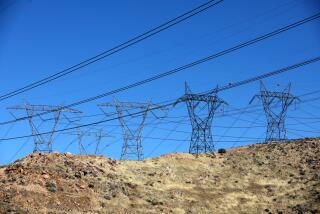PacifiCorp Leading Way to Industry’s Conversion
- Share via
The prospective bid by PacifiCorp to acquire Britain’s biggest electricity distributor is the most dramatic move yet in a strategy that has put the Portland, Ore., utility at the forefront of the rapid transformation of the power industry.
PacifiCorp, whose negotiations to acquire Energy Group for nearly $6 billion were disclosed late Tuesday by the British firm, was early to recognize that the future of the utility industry will belong to large, diversified companies that are low-cost producers.
The transatlantic matchup also fits the growing conviction of leaders in the utility industry--including PacifiCorp’s highly regarded chief executive, Fred Buckman--that to survive, companies must be global in the same sense that airlines, ad agencies and auto manufacturers must follow customers around the world. Moreover, foreign utility operations offer the promise of higher returns, faster growth and lighter regulation.
In this country, PacifiCorp already has 1.4 million customers in seven states, ranking it third among electric utilities in the West after Pacific Gas & Electric with 4.6 million and Southern California Edison with 4.1 million.
But the size and scope of the deal for London-based Energy Group would vault PacifiCorp into a league with Southern Co., Entergy, Duke Power and National Energy of the United Kingdom as international operators, said Ed Tirello, utility analyst with NatWest Markets of New York.
The deal would put PacifiCorp neck and neck with Southern Co. of Atlanta as the nation’s largest utility in sales with a combined $10.4 billion in revenue.
“All of a sudden, this deal puts PacifiCorp in the ranks of the truly global players,” Tirello said. “I think this is a great, great merger. I personally think this is a marriage made in heaven, because it’s the only U.S. company that could acquire it and benefit on all fronts.”
An Energy Group deal would complement PacifiCorp’s businesses in a number of ways, Tirello said.
It would give the Oregon firm control of Energy Group’s Peabody Coal, which owns vast coal reserves in the United States and Australia that PacifiCorp could use to supply its power generation plants. PacifiCorp would also get Energy Group’s Citizens Lehman Power marketing firm, the largest merchant of energy on the East Coast.
PacifiCorp continued to decline all comment on such talks, but investors seemed to embrace the idea. PacifiCorp’s shares climbed 3.6% or 75 cents to close at $21.75 in New York Stock Exchange trading Wednesday as investors and analysts showed their approval of its bid.
Among PacifiCorp’s more prescient moves, analysts say, was the 1995 acquisition of Powercor, an Australian utility near Melbourne. That deal that not only gave it 550,000 more customers, but a laboratory in which to develop energy marketing techniques for use in the United States. Some Australians can choose their electricity providers, as Americans will soon be doing.
But globalization is only part of the formula for success in the coming deregulation of the nation’s energy markets, which were once monopolized by government-protected utilities but which will soon to be subject to cutthroat competition. California will help lead the transformation starting January when it becomes the first state to fully open up its electricity market to competition.
Marketing know-how is another key, and PacifiCorp has a reputation as a skilled and innovative vendor of wholesale electricity, becoming the West’s top power merchant. The company had $739 million in revenue from those activities last year, or 17% of its $4.3 billion total.
It was a big reason the utility finished a close second to Duke/Louis Dreyfus as the Los Angeles Department of Water and Power’s choice as a strategic partner earlier this year. The alliance still has not been approved by City Council, however.
“They are very aggressive, they understand the power market very well and Fred Buckman is certainly one of the most impressive people in the industry,” said William McCarley, DWP’s recently retired general manager.
Much of PacifiCorp’s success in selling power is due to the simple fact it has cheap power to sell because it burns coal for 60% of its energy, analysts say. It has no high-cost nuclear plants weighing it down, nor is it saddled with numerous costly alternative-energy contracts as are California utilities.
PacifiCorp also mines its own coal, further lowering its costs. With 22.6 million tons last year, it was the nation’s 12th-largest coal producer. For these reasons, PacifiCorp produces energy at an average 4 cents per kilowatt hour--or half the national average--and delivers it to customers over an efficient transmission grid.
Meanwhile, the company’s power plants run at 80% of generation capacity, or twice the national average, a sign of its efficient operations, Tirello said.
PacifiCorp is also diversifying. This year it bought TCP, a gas pipeline and storage company in Texas, to add to its energy mix. PacifiCorp already owns Pacific Telecom, a telephone company with 559,000 customers, a base it hopes to build on, though there was speculation Tuesday that it might sell the phone unit to help pay for the Energy Group purchase.
And in January, it formed a joint venture with KN Energy of Colorado to help it develop an array of non-power consumer services ranging from appliance repair to cable television.
More to Read
Inside the business of entertainment
The Wide Shot brings you news, analysis and insights on everything from streaming wars to production — and what it all means for the future.
You may occasionally receive promotional content from the Los Angeles Times.









